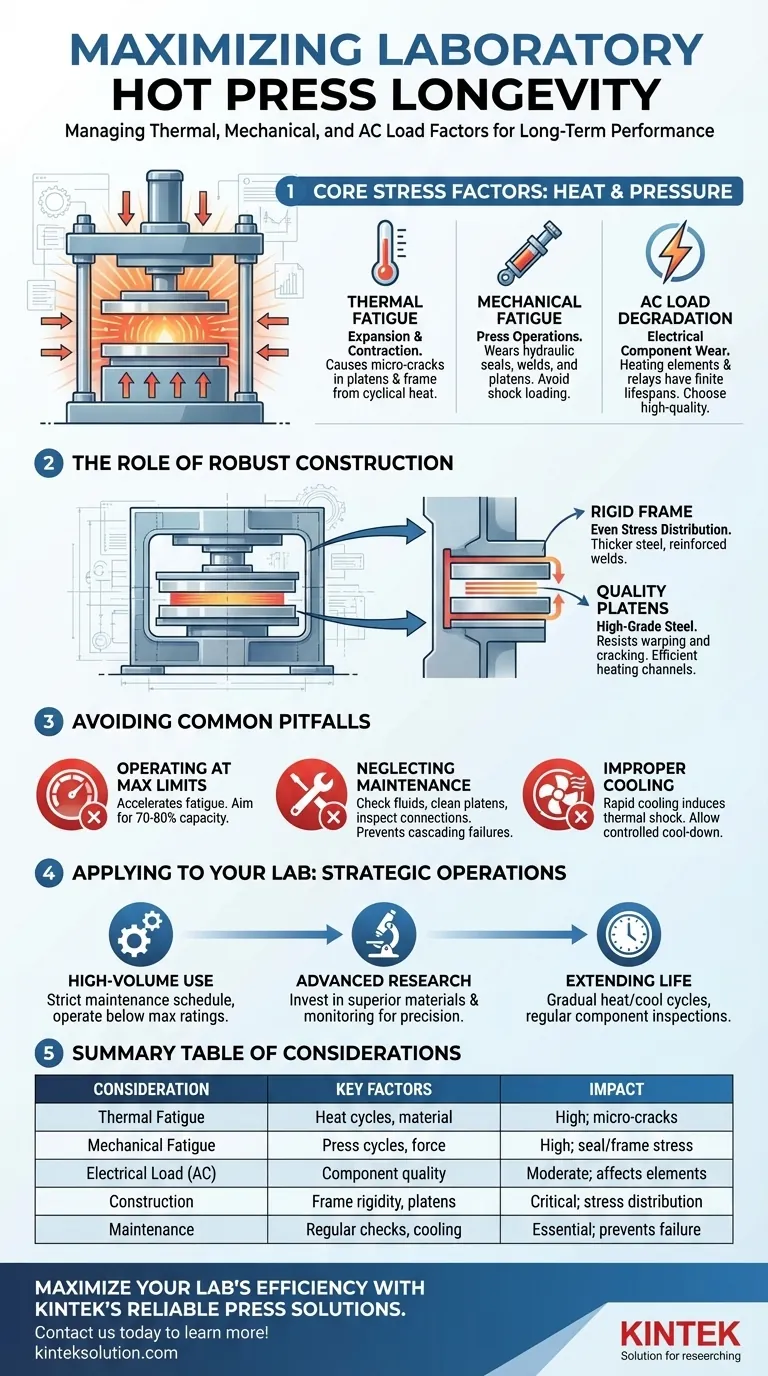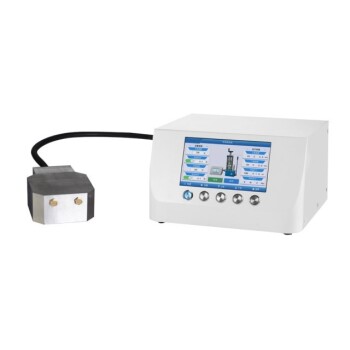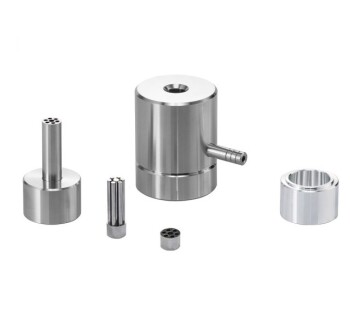To ensure the longevity of a laboratory hot press, you must manage the cumulative effects of thermal and mechanical fatigue on its core components. The lifespan is not determined by a single factor but by the interplay between operating cycles, material quality, and preventative maintenance. A robustly constructed press is designed to distribute these stresses, but its operational protocols are what ultimately preserve its performance and reliability over time.
The central challenge to a hot press's lifespan is the management of cyclical stress. Every heating and pressing cycle introduces thermal and mechanical fatigue, and longevity is achieved by selecting a well-designed machine and operating it in a way that minimizes the intensity and frequency of these peak stresses.

The Core Stress Factors: Heat and Pressure
A laboratory hot press is fundamentally a machine designed to endure extreme conditions. Understanding the sources of wear is the first step in mitigating them.
Thermal Fatigue from Heat Cycles
Every time the platens heat up, the metal expands. When they cool, they contract. This thermal cycling is a primary source of stress.
Over thousands of cycles, this expansion and contraction can lead to micro-cracks, especially in the heating platens and surrounding frame. High-quality materials resist this better, but no material is immune. Operating at the absolute maximum temperature rating continuously accelerates this process.
Mechanical Fatigue from Press Operations
The physical act of pressing generates immense force. This force is channeled through the hydraulic system, frame, and platens.
Each press cycle contributes to mechanical fatigue. This wears down hydraulic seals, stresses welds on the frame, and can even cause the platens to deform over long periods. Abrupt pressure changes or "shock loading" are particularly damaging.
Electrical Component Degradation (The "AC Load")
The "AC load" refers to the electrical demand of the heating elements and control systems. These components have a finite lifespan.
Heating elements degrade with use, their electrical resistance changing over time, which can affect temperature accuracy before they eventually fail. Relays and controllers that manage this load also have a limited number of cycles before they wear out, making high-quality electrical components a critical factor for long-term reliability.
The Role of Construction and Materials
While operation matters, the inherent design and material choice of the press set the upper limit for its potential lifespan. The "robust construction" mentioned in research notes is not a marketing term; it's an engineering principle.
Frame Rigidity and Stress Distribution
A well-engineered frame is designed to distribute press forces evenly, preventing stress from concentrating in one area. Thicker steel, reinforced welds, and a rigid, four-post design are hallmarks of a press built for longevity. This prevents the frame from flexing, which protects platens and hydraulic components.
Platen Material and Design
The platens are subject to the most intense combination of heat and pressure. Platens made from high-grade, stress-relieved tool steel are far less likely to warp or crack than those made from lower-quality materials. The design should also incorporate efficient, evenly-spaced heating channels to prevent hot spots that create localized stress.
Quality of Hydraulic and Electrical Systems
The reliability of the "unseen" components is paramount. A high-quality hydraulic pump and durable seals will withstand more cycles before requiring maintenance. Similarly, using solid-state relays (SSRs) instead of mechanical ones for controlling the heaters dramatically increases the lifespan of the electrical control system by eliminating moving parts.
Understanding the Common Pitfalls
Even the best equipment can fail prematurely if not managed correctly. Avoiding common mistakes is as important as buying a quality machine.
Operating at Maximum Limits Continuously
A press rated for 25 tons and 500°C is not meant to be run at those limits for every single operation. Consistently pushing the equipment to its absolute maximum dramatically accelerates both mechanical and thermal fatigue. Operating at 70-80% of maximum capacity whenever possible will significantly extend its life.
Neglecting Preventative Maintenance
Simple maintenance tasks are the most effective way to ensure longevity. Ignoring hydraulic fluid levels, failing to clean and inspect platens for debris, or not checking electrical connections can lead to cascading failures. A small leak or a loose wire can quickly become a major repair.
Improper Cooling Procedures
Allowing the press to cool too rapidly can also induce thermal shock, a more aggressive form of thermal stress. Whenever possible, allowing the press to cool down in a controlled manner is preferable to forced cooling with air or water, unless the system is specifically designed for it.
How to Apply This to Your Lab
Your operational strategy should align with your primary goals, whether they are high-throughput production or precision research.
- If your primary focus is high-volume, routine use: Prioritize a strict maintenance schedule and operate the press consistently below its maximum temperature and pressure ratings.
- If your primary focus is advanced materials research: Invest in a press with superior materials (e.g., stress-relieved steel platens) and advanced monitoring, accepting the higher upfront cost for greater precision and durability under novel conditions.
- If your primary focus is extending the life of existing equipment: Implement a protocol of gradual heat-up/cool-down cycles and regularly inspect hydraulic seals and electrical relays, as these are often the first components to fail.
Ultimately, viewing your hot press as a long-term asset that requires methodical care is the key to maximizing your investment.
Summary Table:
| Consideration | Key Factors | Impact on Longevity |
|---|---|---|
| Thermal Fatigue | Heat cycles, material quality | High; causes micro-cracks and wear |
| Mechanical Fatigue | Press cycles, force distribution | High; leads to seal and frame stress |
| Electrical Load (AC) | Component quality, usage cycles | Moderate; affects heating elements and controls |
| Construction | Frame rigidity, platen design | Critical; ensures even stress distribution |
| Maintenance | Regular checks, controlled cooling | Essential; prevents premature failures |
Maximize your lab's efficiency and equipment lifespan with KINTEK's reliable lab press machines, including automatic lab presses, isostatic presses, and heated lab presses. Our solutions are tailored to meet your laboratory needs, offering superior durability and precision. Contact us today to learn how we can support your operations and extend the life of your hot press!
Visual Guide

Related Products
- Automatic High Temperature Heated Hydraulic Press Machine with Heated Plates for Lab
- Laboratory Manual Heated Hydraulic Press Machine with Hot Plates
- Manual Heated Hydraulic Lab Press with Integrated Hot Plates Hydraulic Press Machine
- Automatic Heated Hydraulic Press Machine with Hot Plates for Laboratory
- Lab Heat Press Special Mold
People Also Ask
- Why is a hydraulic heat press critical in research and industry? Unlock Precision for Superior Results
- What is the role of a hydraulic press with heating capabilities in constructing the interface for Li/LLZO/Li symmetric cells? Enable Seamless Solid-State Battery Assembly
- What role does a heated hydraulic press play in powder compaction? Achieve Precise Material Control for Labs
- Why is a heated hydraulic press considered a critical tool in research and production environments? Unlock Precision and Efficiency in Material Processing
- How does using a hydraulic hot press at different temperatures affect the final microstructure of a PVDF film? Achieve Perfect Porosity or Density



















